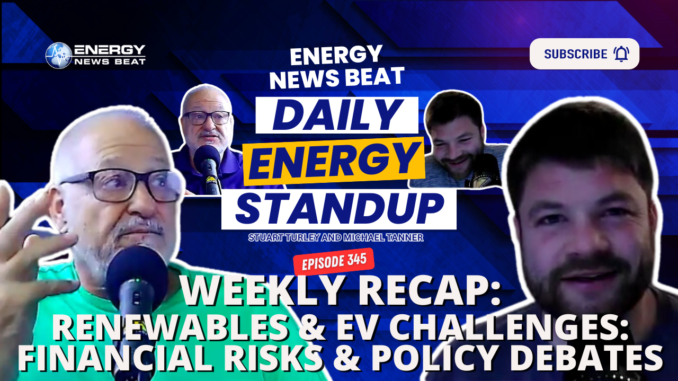
Weekly Daily Standup Top Stories
Mounting Losses Mean Sweden’s Wind Industry Faces Total Financial Collapse
Notwithstanding €billions in subsidies, Sweden’s embattled wind industry is on the brink of total financial collapse. The majority of Swedish wind power outfits are underwater, bleeding cash and have no hope of recovery. In the […]
Solar panel waste to reach crisis levels in next two to three years, Australian experts warn
A 12-year industry roadmap has been unveiled to address the rising amount of solar panel waste headed for the tip The solar industry is quickly approaching its tipping point, with unprecedented levels of waste headed […]
BlackRock hit with ‘cease and desist’ after allegedly misleading investors about ESG practices
Mississippi Secretary of State Michael Watson and the Securities Division of the Secretary of State’s Office have issued a “Cease and Desist Order” against asset manager BlackRock, alleging deceptive practices regarding the company’s Environmental, Social, […]
Good news and bad news on Pa. electricity includes reduced CO2 emissions but high costs for residents
There’s the good news regarding the state’s electricity generation for 2023. Electricity was cleaner and local electricity was more reliable. Pennsylvania reduced its carbon dioxide emissions by 10%, the largest year-over-year decline since 1990, largely […]
Cost of Electrifying Commercial Truck Fleet is $1 Trillion
In infrastructure alone, full electrification of the U.S. commercial truck fleet would require nearly $1 trillion according to a new report from Roland Berger released on March 19 by the Clean Freight Coalition. The study forecasts an infrastructure […]
Buttigieg rejects critics of EV future: Like people in 2000s saying we could have landlines forever
Transportation Secretary Pete Buttigieg rejected criticism of the Biden administration’s push for America to embrace a future where electric vehicles (EVs) overtake internal combustion engines, comparing the dynamic to that of landline phone loyalists at the dawn […]
Highlights of the Podcast
00:00 – Intro
01:05 – Mounting Losses Mean Sweden’s Wind Industry Faces Total Financial Collapse
03:16 – Solar panel waste to reach crisis levels in next two to three years, Australian experts warn
06:48 – BlackRock hit with ‘cease and desist’ after allegedly misleading investors about ESG practices
08:56 – Good news and bad news on Pa. electricity includes reduced CO2 emissions but high costs for residents
11:00 – Cost of Electrifying Commercial Truck Fleet is $1 Trillion
13:22 – Buttigieg rejects critics of EV future: Like people in 2000s saying we could have landlines forever
16:41 – Outro
Follow StuartOn LinkedIn and Twitter
Follow Michael On LinkedIn and Twitter
– Get in Contact With The Show –
Video Transcription edited for grammar. We disavow any errors unless they make us look better or smarter.
Michael Tanner: [00:00:15] What’s going on, everybody? Welcome into the Saturday, April 6th, 2024 edition of the Daily Energy News Beat stand up. It is our weekly recap. We appreciate you guys checking us out, man. It’s been a long week. It’s been a crazy week OPEC Matt. You know we also saw do a lot of eye stuff going on. I mean just a busy week to us. That’s your little money thing. Yeah absolutely. [00:00:39][24.3]
Stuart Turley: [00:00:40] Love it. Yeah. The whole staff did a great job. [00:00:42][2.3]
Michael Tanner: [00:00:43] Yeah. Staff always does a great job. Great interview released. Check out the interview we did with JT on the podcast yesterday. Guys. We just ran that. So please, let’s take a look at that. You can find that in the description below. And always check out all the links to the articles that we’re about to cover in the weekly recap. Again, energynewsbeat.com. I’m going to give it up to the team though. Let’s see what’s up first. [00:01:04][20.7]
Stuart Turley: [00:01:05] Mounting losses means Sweden’s wind industry faces total financial collapse. I’ll tell you. This one is pretty, amazing. When you sit back and take a look, the total loss for the years 2017 through 2022 amounted to 13.5 billion, just in losses in, the Swedish corner, which is 1.2 billion in U.S, 13.5 billion Swedish Corona, 1.2 billion in euros, which is a net loss margin of 39%. You can’t operate a business for that long, by any stretch of the imagination for being, 39%, negative money since The Economist’s, initial findings, Sweden’s largest wind farm insulation of 179 turbines is now facing bankruptcy. With millions of krona in debt. Unbelievable. The losses are simply because the industry cannot produce electricity at a cost below market price. Despite extensive subsidies. This would put any other industry out of business if this was not mandated by, government and the forced to, quote unquote, renewable energy. No, this is not market friendly at all. And when you take a look at the fact that these wind turbines are not recyclable, this is really devastating for the economy and the environment. Let me know what you think. Let us know. It share in the comment sections. Let us know. Reach out to us if, you see this, this trend happening around the world as we are solar panel ways to reach crisis levels in the next 2 to 3 years. And Australian experts warn 12 year industry roadmap has been unveiled to address the rising amount of solar panel waste headed up for the trip. The solar panel is quickly approaching its tipping point. I’ll tell you what it already has the amount of waste that they are, solar panels are not recyclable. They are filled with hazardous materials, and they are being improperly disposed and just put in land waste or put on ships and ship to other countries. So the energy hypocrisy of the United States needs to not buy solar panels from child, abused systems, or wait until we can actually use solar panels that can be recycled. This is critical. How about the, 3300 acres of Texas wind farm solar panels that just got destroyed in a, a hail storm? Those are now headed to a landfill. And all of those 3000, three, 800 acres are not even usable until reclamation can happen. Here is a quote. If we get this right, we can close this loop in a way that will underpin the Australian life for generations with the recovery and recycling of these precious metals and rare earth inside discarded end of life panels, I applaud this. Let’s take a look at it. The federal government. Announced Friday in a $1 billion funding boost aimed at increasing the number of Australian made solar panels, which may increase the number of solar panels designed in a manner that makes recycling easier. Currently, 90% of the Australia panels used in Australia are imported from China. Okay, you take a look at the $1 billion fund. They are going to be using. It is not going to be, technologically. This is again not solving the problem. Building solar panels that from materials that can be recycled is critical. And then being able to sustain power at market rates is unbelievably critical. So keep an eye on this. But again, the only thing that we’ve seen from the renewable industry is the wealth distribution and transfer of wealth. This has not been anything other than, taxing and then taxing from the taxpayers and going to the rich. And that’s all this has been. And this may be something similar. I am all in on solar if it can be recycled. And, hopefully we’re going to follow this to see if it does happen. Blackrock hit with cease and desist after allegedly misleading investors about ESG practices. Couldn’t happen to a nicer guy. The Subheadline is. The cease and desist order was issued by Mississippi Secretary of State Michael Watson. Michael, quote, Blackrock made untrue statements of certain to its fund do not incorporate ESG considerations as detailed extensively in this order. Blackrock stated on multiple occasions, either expressively through publications or by action. The company does in fact incorporate ESG considerations in as non ESG funds. I think this is absolutely hysterical that ESG investing hypocrisy or Kim is coming from the folks that are yelling, about investing in green and trying to kill the fossil fuel industry. I just thought it was really pretty funny. [00:07:55][410.2]
Michael Tanner: [00:07:56] Yeah. I mean, we love a good energy hypocrisy. I love the fact that it’s completely now turned on its head. They were so far down the ESG rabbit hole, and now they’re getting a cease and desist letter to stop. [00:08:08][11.8]
Stuart Turley: [00:08:09] There’s no I. [00:08:10][0.4]
Michael Tanner: [00:08:10] Think this is more of a show of, hey, we don’t like Blackrock. Will this go anywhere where they’ll maybe be some fines. [00:08:16][6.2]
Stuart Turley: [00:08:17] This. There’s about 13 other states that have their states that are bailing out, $8 billion. Last week you and I covered out of Texas, you know, giving them the double barrel finger and then notably, read Blackrock just recently withdrew from the Climate Action 100 Alliance. You and I talked about when is investor hypocrisy going to hit a, all time like, hey, we need our money back here. I think we finally are finding what then work is. [00:08:54][36.7]
Michael Tanner: [00:08:54] Yeah. No. Absolutely. [00:08:55][0.7]
Stuart Turley: [00:08:56] Good news and bad news for Pennsylvania. I’m full of good news. I’m a cheery kind of guy. Today, electricity includes reduced CO2 emissions, but a higher cost for residents. Here’s the subtitle. According to a Peco report in Pennsylvania, reduced its carbon dioxide emissions by 10%, the largest year on year decline since 1990. But the cost of cents per kilowatt hour is higher than the national average. Retro. Now here’s where the some stats come in. Pennsylvania is still highly dependent on natural gas. Fossil fuel for 59% of its electrical generation, more than the U.S, average. It should be 100%. [00:09:45][49.4]
Michael Tanner: [00:09:46] You’re literally in the heart of the Appalachia basin. Why is it not a hundred? [00:09:51][5.0]
Stuart Turley: [00:09:52] And they want to know why. They want, they only get 3.7% other than fossil fuels or nuclear fuel. Only reason they reduced their CO2 is because of reducing coal plants. Peco. Which operates electric services to 1.7 million customers within bucks, Chester, Delaware, Montgomery, Philadelphia and York counties, is the largest electricity provider in its 45th and country in terms of renewables. [00:10:29][37.3]
Michael Tanner: [00:10:32] But also there’s this quoting here from Thomas Schuster. The only thing present vending Peco from supplying more affordable solar energy to its customers is the antiquated pure procurement process. But yes. So you’re telling me it’s an old procurement process that’s slowing us from a fool? That’s crazy to think about. We know solar doesn’t pay off layer in an antiquated, you know, procurement process. You know, they’re in trouble. [00:10:58][26.5]
Stuart Turley: [00:10:59] Oh, yeah. Cost of electrifying commercial truck fleet is 1 trillion. This doesn’t even include the trucks. [00:11:07][7.8]
Michael Tanner: [00:11:11] Cost cuts. [00:11:11][0.5]
Stuart Turley: [00:11:13] Listen to this article. You can’t buy this kind of entertainment. The charging infrastructure will cost 620 billion, according to a new survey from Clean Freight Coalition. That’s not any of the other stuff. That’s not the updates to the grid. That’s nothing. I mean, that is just absolutely almost nothing. The study forecast infrastructure build out for the electrification of medium and heavy duty commercial vehicles, exposing what the CFC calls a massive investment gap. [00:11:47][33.8]
Michael Tanner: [00:11:49] Massive investment. Yeah. [00:11:50][1.4]
Stuart Turley: [00:11:52] Okay. [00:11:52][0.0]
Michael Tanner: [00:11:53] I think it’s interesting. And, you know, I love this point down here. For example, you know, diesel trucks again, you have to replace these trucks too. So it’s a trillion on everything. But the truck class A diesel costs about $180,000 compared to the battery truck, which is well over 400,000. [00:12:07][14.3]
Stuart Turley: [00:12:10] Exactly. So, now the the particulars bill or the Inflation Reduction Act, they spent what, $7 billion and got 2 or 3 in chargers installed. How in the world are you going to charge these Mad Dog trucks? You’re going to have a boatload of batteries, and you’re not going to be able to charge them. This is absolutely hilarious. The study found that while medium duty vehicles, will face fewer roadblocks, economic and operational constraints make electrification very challenging for the heavy duty segment. I think it just means to be it. Electrification is tough across the board. [00:12:52][42.8]
Michael Tanner: [00:12:53] Oh, it is tough. I mean, you know, I could have told you that before we started the segment. [00:12:56][3.0]
Stuart Turley: [00:12:57] Oh, yeah. I just thought it was really pretty funny. There’s a couple there in a statement, also is clear that an industry with a yearly turnover of about $800 billion and a profit margin of around 5%, cannot invest 620 without financial support in order to get it done. Really? Wow. This is this is like Oklahoma State kind of math here. Wow. [00:13:20][22.8]
Michael Tanner: [00:13:21] No kidding. [00:13:21][0.3]
Stuart Turley: [00:13:23] Buttigieg rejects critics of EV future like people in the 2000 saying we would have landlines forever. I want to just give him a little bit. Hey, Mr. Buttigieg, if you are listening to this podcast, I would love to have you come on this podcast. I got a few questions for you. And when we sit back, I’m old enough to know, a I know Moses personally, but me old. [00:13:50][27.6]
Michael Tanner: [00:13:50] Enough I have this. You’re old enough to do you go back a ways? [00:13:54][3.8]
Stuart Turley: [00:13:55] Yes, I do. Me and Moses are buddies. And when we sit back and take a look at whether or not when did landlines come around? It was because of the market adoption in technology. And so it was I mean, I remember having a line phone line and it was a party line and everybody big piles in, can I do this? And your neighbor up the hill was a psychopath and you didn’t know what was going on. Let’s get back to this story. When America reports, anchor Sandra Smith reported on cuts to the workforce for the Ford F-150 Lightning in Dearborn. One third of the workers will remain big boys. All of the, you know, all of the big boys are cutting out their for their GM, and the, union folks didn’t do it. Biden killed union job. What a chowder head. Tesla is facing more competition as GM and Ford and Stellantis and other competitive players start to make the piece of the EV market. I agree with you. My, Michael, I don’t see Tesla losing out, because I. People are going to buy a Tesla. Oh, yeah. It is. Absolutely. Way to go test. Love me some Tesla. [00:15:20][85.2]
Michael Tanner: [00:15:21] Well, I think what he what he says is in the wake of declining Tesla sales, this is his quote. Let’s be clear. The automotive sector is moving towards EVs, and we can’t pretend otherwise. I don’t know if the overall are Tesla’s gaining market share. Yes. Are EVs not as much as you would think? I think that’s, you know, interesting. I love the you know, we love the the land line comment. But I mean, it makes sense. I mean, Buttigieg’s got no clue what’s going on. [00:15:48][26.7]
Stuart Turley: [00:15:48] No. And and, I want to, if I missed produce or if you could pull up this Tesla. I want me a Tesla Cybertruck. I want me to say it is bulletproof. I need me a bulletproof car. [00:16:01][12.9]
Michael Tanner: [00:16:02] Right here looking. It’s going through the water. It can’t work. [00:16:04][2.4]
Stuart Turley: [00:16:05] Beep beep beep beep. You know you don’t know me. This is kind of like Biden when he’s doing a speech. And, you know, you guys. [00:16:05][0.0][916.4]
– Get in Contact With The Show –



